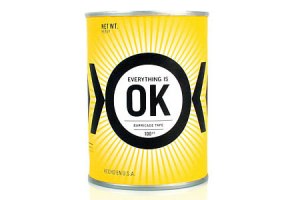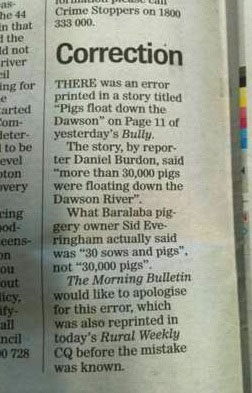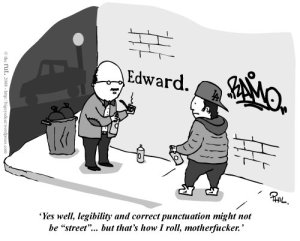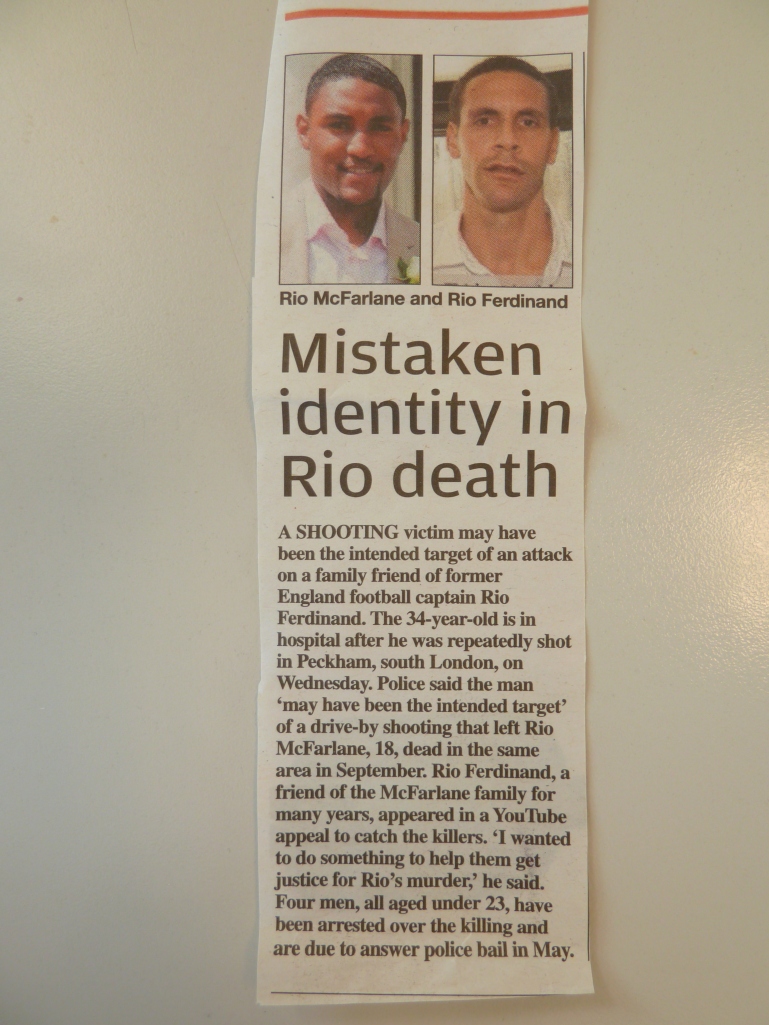This is a cutting from yesterday’s Metro. I challenge you to read it once (without prior knowledge of the story) and understand it. It took me three tries, and some collaboration. Just me?
April 9, 2011
March 14, 2011
When is a crisis not a catastrophe?
 Early this bleary morning, I was half-listening to Radio 4. The newsreader was talking about the second explosion at the Fukushima nuclear plant. I’m not quoting here, but he said something along the lines of “however, the crisis [at the plant] is not expected to become a catastrophe”.
Early this bleary morning, I was half-listening to Radio 4. The newsreader was talking about the second explosion at the Fukushima nuclear plant. I’m not quoting here, but he said something along the lines of “however, the crisis [at the plant] is not expected to become a catastrophe”.
My ears pricked up at this – I’d kind of assumed a crisis and a catastrophe were one and the same. But as I was simultaneously pulling on my boots, mainlining a cup of tea and brushing my teeth in a triumph of elegant multitasking, I didn’t have a spare hand to reach for the dictionary.
I’ve just looked them up now, and there’s definitely a difference.
From the OED:
Crisis:
- a a decisive moment. b a time of danger or great difficulty.
- the turning point, esp of a disease.
Catastrophe
- a great and unusually sudden disaster.
- the denoument of a drama.
- a disastrous end; ruin.
- an event producing a subversion of the order of things.
So a crisis, rather than being a disaster, is the point when something becomes (or doesn’t become) the kind of disaster that ends life as we know it.
Go Radio 4.
I wish I’d found out in happier circumstances, though. Ganbatte, Nihon, ganbatte.
March 12, 2011
The mother of apostrophe dilemmas
 Around this time every year, someone always raises the question of Mother’s Day. Of three things you can be sure:
Around this time every year, someone always raises the question of Mother’s Day. Of three things you can be sure:
- It won’t be my brother
- Much tutting and sighing will be done over apostrophes, singular mothers, plural mothers and generic mothers
- By this time next year, we’ll all have forgotten again
This year is different. Yes! This year I will excite you with tidbits that may even be true, our memories will be stimulated and next year we shall be able to nod sagely and answer without hesitation when some other fool raises the question.
Mother’s Day was founded in America by Anna Jarvis. She started campaigning for it in 1905, following the death of her mother, and seven years later trademarked both “Mother’s Day” and the phrase “second Sunday in May”. According to this rather lovely article on Canada.com:
She was specific about the location of the apostrophe; it was to be a singular possessive, for each family to honour their mother, not a plural possessive commemorating all mothers in the world.
Incidentally, Jarvis went on to campaign against the commercialisation of Mother’s Day. But before you consider making that argument when you forget your flowers on 3rd April (note my handy warning), beware – the alternative is to wear a carnation and write a heartfelt letter. Suddenly M&S doesn’t sound so bad, huh?
However, we Brits, because we are super, actually had our own celebration before the Americans got in on the act (the sixteenth century, according to that bastion of accuracy, Wikipedia). It was always the fourth Sunday in Lent and girls in domestic service were given the day off to visit their “mother church” (nearest chunkily sized church or cathedral, so far as I can work out).
Somewhere along the way it became a day to visit mothers, and lo a need for cake came to pass, along with a need to decorate it with 11 disciples. Now I’m not sure whether one baked it for one’s mother or with one’s mother, but either way, a simnel cake was magicked into the world. And just this once I’m going to grace you with a recipe to enjoy with your gratuitous word facts [slobber]. Don’t get used to it. However, because of the rules of Lent, until Easter the only permitted interaction with the cake was to look at it. Yum.
Mothering Sunday lost popularity in the industrial revolution, but when we met those golden and strapping Americans and Canadians during the second world war, we decided we liked it again. We kept our traditional date, though, and still celebrate on the fourth Sunday of Lent, which this year puts us one week ahead of the US.
The short version, though, is Mother’s day. Apostrophe ess. “Mothering Sunday” now, unfortunately, just sounds too quaint.
I want cake.
March 11, 2011
Running in the family
February 18, 2011
OK
 There’s an interesting article on the history of OK on the BBC website today – here. The expression, not the magazine. (I was trying to avoid describing it as a ‘word’, y’see.)
There’s an interesting article on the history of OK on the BBC website today – here. The expression, not the magazine. (I was trying to avoid describing it as a ‘word’, y’see.)
I’ve never thought about the origins of OK before. Personally, I am not a fan. When not restricted by a house style, I prefer to write okay. None of those horrible capital letters bullying the rest of my copy, all ostentatious and look-at-me-ish. (I was quite surprised to read that OK is the true spelling and okay the newcomer.)
So, no, I’m no expert on OK. Yet it strikes me that the article doesn’t cover everything that it should.
Firstly, the ‘joke’ escapes me – “o.k. (all correct)”. Ijusdongeddit. Secondly, the writer says:
What OK provided that the others did not was neutrality, a way to affirm or to express agreement without having to offer an opinion.
Consider this dialogue: “Let’s meet again this afternoon.”
Reply: “OK.”
Compare that with: “Let’s meet again this afternoon.”
Reply: “Wonderful!” or “If we must.”
But what about all right (or even alright, which I rather like) – doesn’t that fulfil exactly the same function?
And, thirdly, there are the excellent points made in the comments section. Several people mention au quai, from on the quay – meaning “safely docked”, or “ready to load”, or similar. Then there are the phonetic similarities with the Scottish och aye and the German alles klar, as well as several mentions of a battlefield abbreviation for zero killed. Even if these are all wrong (or, erm, ‘urban myths’, as one commenter calls them), they should at least have been mentioned and discounted.
But then, apparently this chap’s written a whole book on the subject. Yes, really. The Improbable Story of America’s Greatest Word. So maybe he mentions them there. That’d be OK (ugh).
February 16, 2011
A question of form
 I have just received this email. Frustratingly, I don’t know the answer either. Anyone?
I have just received this email. Frustratingly, I don’t know the answer either. Anyone?
Hi Cathy,
Received this from my friend ‘The Headkicker’ James [oh that one, yes, he and his apostrophe have cropped up before] today. I don’t know the answer…
I have a new grammar conundrum for your friend’s blog that needs answering: On a form you often see a word with an (s) after it if the answer could be single or plural – e.g. Enter middle name(s) here: etc.
What happens when you have a word that doesn’t pluralise so conveniently such as property/properties? Is it acceptable to have property(s)? We all know what it is asking but is it grammatically correct? Is there even a rule of grammar that covers this sort of thing? Am I putting too much thought into the new house name change application form I am creating? Probably.
What do you reckon Relfy?
I hope are well and you don’t have VD*,
Dave
February 9, 2011
30,000 pigs
 What’s that you say? Thirty thousand pigs? No… thirty sows and pigs!
What’s that you say? Thirty thousand pigs? No… thirty sows and pigs!
Love it. It’s a correction from Monday’s issue of Australia’s Morning Bulletin newspaper.
February 4, 2011
Single-sex schools: the perks
 Crikey. Thanks to the Gloucestershire Echo for this wonderful headline (via @MarcusDysch via @batterseaprince.)
Crikey. Thanks to the Gloucestershire Echo for this wonderful headline (via @MarcusDysch via @batterseaprince.)
January 20, 2011
The Great Style Debate
Simon Heffer, the associate editor at The Telegraph: “We’re singing from the same hymn sheet.”
David Marsh, the style guide editor at the Guardian: “Well, we wouldn’t use a cliché like that, but yes.”
That pretty much sums up the tone of The Great Style Debate last night. Those in the audience hoping for a punch-up will have been sadly disappointed; it was a most civilised affair. Mr Heffer and Mr Marsh certainly have their differences, but they have much more in common – namely a love of language and an affinity with their readers.
What’s the point?
Those of us who work with style guides every day hear a lot of negativity about house style, which is often branded restrictive, pointless and annoying. So it was nothing short of uplifting to see the enthusiasm and sense of purpose with which the two men approach their respective house styles.
Both emphasise that their style guides are not designed to limit creativity, but to reflect the values of their readers. Thus The Telegraph’s style guide (allegedly) contains no fewer than four entries on how to refer to the Queen. It also specifies that the place we all go to should be called the lavatory, and never the toilet (“toilet: use only to describe the personal cleansing regime”).
Mr Marsh gives the example of schizophrenic. “In the past it was used to describe someone who couldn’t make their mind up. Considering our readership, you can imagine that they’re going to find that quite offensive.”
The Guardian style guide now reads: “schizophrenic, schizophrenia: use only in a medical context, never to mean ‘in two minds’, contradictory, or erratic, which is wrong, as well as offensive to people diagnosed with this illness; schizophrenic should never be used as a noun.”
Forbidden words
Both men stressed that their style guides, unlike those of “The Financial Times and a paper in the region of Wapping” (ooh, bitchy), weren’t designed to “make every writer sound the same”. However, that doesn’t mean any word goes – especially at The Telegraph.
Four of Mr Heffer’s pet hates:
autopsy “American for postmortem.”
bubbly “A preposterous adjective, so frequently used to describe some unfortunate blonde killed in a car crash. And if she’s from an ethnic minority, it’s ‘vibrant’.”
extraordinary “If it was ordinary, it wouldn’t be in the paper.”
adjectives “I don’t like adjectives. It took me a long time to realise that instead of describing George Osborne as an ‘idiotic chancellor’, I could simply use a noun: ‘dolt’.”
Mr Marsh is more reluctant to ban words, though he strongly discourages the use of some.
“Reporters tend to use ‘controversial’ when they disapprove of something, which is fine in a column, but not in news,” he says. “And anyway, we wouldn’t write about it if it wasn’t controversial. However, we don’t ban the word, we just say think carefully about how you use it.”
Accordingly, the style guide reads: “[controversial] can normally be safely removed from copy to allow readers to make up their own minds.”
Swear words
If it’s banned words you’re after, head to The Telegraph’s entry on swearing – sorry, obscenity.
obscenity: always seek guidance in reporting foul language. It may be necessary to use dashes (not asterisks) to indicate the deletion of obscenity from direct quotes. Gratuitous use of obscenities is forbidden. The presumption must always be that profanities are forbidden.
“Our readers just don’t like it,” says Mr Heffer. And he’s probably right.
Hmm, so what does that say about Guardian readers? There were 700 fucks in the Guardian last year, and a further 300 in the Observer, according to Mr Marsh.
“It seems rather strange, in this day and age, to insert dashes or asterisks,” he says. “You say it’s to protect the children, but it’s just a challenge for them. They sit there and try to work it out like a crossword.”
In the style guide, the editor’s guidelines read as follows:
First, remember the reader, and respect demands that we should not casually use words that are likely to offend.
Second, use such words only when absolutely necessary to the facts of a piece, or to portray a character in an article; there is almost never a case in which we need to use a swearword outside direct quotes.
Third, the stronger the swearword, the harder we ought to think about using it.
Finally, never use asterisks, which are just a cop-out.
And a little ego
You have to have a bit of ego. Of course you do. Damn, I have ego when it comes to these things, and I’m just a bog-standard sub. If I had compiled a style guide for a major newspaper, I’m sure I’d be unbearable. So perhaps we ought to let them bask in the glory of a room full of admiring subs.
According to Mr Marsh, there is no such thing as plagiarism when it comes to style guides. “We’re always pleased if people decide to adopt our style,” he says, and boasts that his explanation of that and which is now used around the world.
So here it is, for your delectation – steady now:
“that” defines, “which” gives extra information (often in a clause enclosed by commas):
this is the house that Jack built; but this house, which John built, is falling down.
Note that the sentence remains grammatical without “that” (this is the house Jack built), but not without “which”
And in response to a question from the audience about how style is decided for new words, he was equally jubilant. “I claim to be one of the first people to write email without a hyphen. In 1999, my attitude was that no-one would be hyphenating it in a few years, or capitalising Internet or writing Web site. It’s about anticipating usage and the morphology of words.”
No such luck on thinktank, however. To date, he admits, the Guardian is the only publication to write it as one word.
Mr Heffer’s ego-massage takes a different form – perfectionism. He seems to believe that a sub (or associate editor) shouldn’t need subbing. I’m not convinced that I agree. I sub when I sub and I write when I write. I don’t hold my writing to quite the same high standards as I do my subbing, and I’ll freely admit that when it comes to my own copy, another sub will probably do a much better job of editing it than I will if I do it myself.
“I’m terrified of making a mistake in my columns,” he says. “When I’ve finished writing, I read it through and remove all the extraneous words, which is something all journalists should do. Then I go and run my head under cold water, come back and read it again. People are always looking for mistakes, so I can’t afford to make any.”
I object to this, on two counts. One, surely a sub shouldn’t inflict on others that which he or she is unwilling to undergo. If you are a changer of copy by trade, you should be willing (and trusting enough) to have your copy changed. And two, I find my writing is often improved by being subbed by another. But then I work mostly on magazines, where subbing tends to be more – shall we say – intrusive than on newspapers. (And I’m not Simon Heffer.)
“Luckily, the people who sub my columns are very good sub-editors,” he adds. (And I do wonder whether the subtitles should read: “Luckily, the people who sub my columns know not to touch my copy.”)
Other highlights
begs the question (DM: “it’s so heartwarming when it’s occasionally used correctly”)
railway stations vs train stations (DM: “no-one under 40 says the former”)
prevaricate vs procrastinate (SH: “that’s just a case of people forgetting what words mean”)
stadia (SH “I took the decision to abolish Latinate plurals such as stadia following an exchange in which I was asked what the plural of clitoris was. It’s clitorides.”)
My favourite moment, however, was when Mr Marsh, apparently quite innocently, got one over on the audience. In a find-the-errors quiz that was handed out at the start, there lurked a “just desserts”. When he pointed out that it should, in fact, be “just deserts”, there was uproar, outcry and an angry shaking of papers. “But that would say ‘deserts’,” cried a man in my row, full of righteous fury.
I looked on smugly (undeservedly, considering that it really wasn’t that long since I found out). Yes folks, it is so. “Desert” is a noun (now obsolete) meaning “that which is deserved”. Think about it – when was the last time you were rewarded for a bad deed with a nice pudding?
Ps. How terrified am I that I’ve made some awful boob in this post? Let’s just say I’m off to the lavatory.
January 19, 2011
Extreme editing
 If you take the train northwards between Elephant & Castle and London Bridge on a bright and blustery morning (looking out of the right-hand window, to be specific), you may have the good fortune to see the following graffiti. (Bright and blustery mornings are optional.)
If you take the train northwards between Elephant & Castle and London Bridge on a bright and blustery morning (looking out of the right-hand window, to be specific), you may have the good fortune to see the following graffiti. (Bright and blustery mornings are optional.)
Written in huge white letters, at least a foot high, on a brick wall:
BUDGET CUTS
But what’s that? Look closer, and you’ll see that it originally read:
BUDGET CUTS AND CORPORATE SLUTS
The last three words have been scrubbed off. Why? Well, I guess because “slut” was deemed offensive enough to need removing.
I assume the scrubbing was done either by rail company employees or the local council. What I really want to know, however, is who made the decision to remove three of the five words, rather than just the one. I like to imagine it was the person with the scrubbing brush, but it could have been someone in an office somewhere. Either way, I’d like to say to that individual: you rock!
I’m imagining their internal monologue (bucket of soapy water in hand).
“Okay, so I get rid of SLUT.” [Scrub, scrub, sweat.]
“But… that leaves BUDGET CUTS AND CORPORATE… that doesn’t make sense. There’s nothing for it, I’m going to have to take off AND CORPORATE, too. Here goes…” [Scrub, scrub, sweat, scrub, scrub.]
“Ah, that’s better. BUDGET CUTS. Yes, at least that’s tidy and not grammatically incorrect. A good morning’s work.”
It makes hitting the delete key (or even ctrl+F8, not that we use it here, grumble grumble, but I digress) seem positively lazy.
